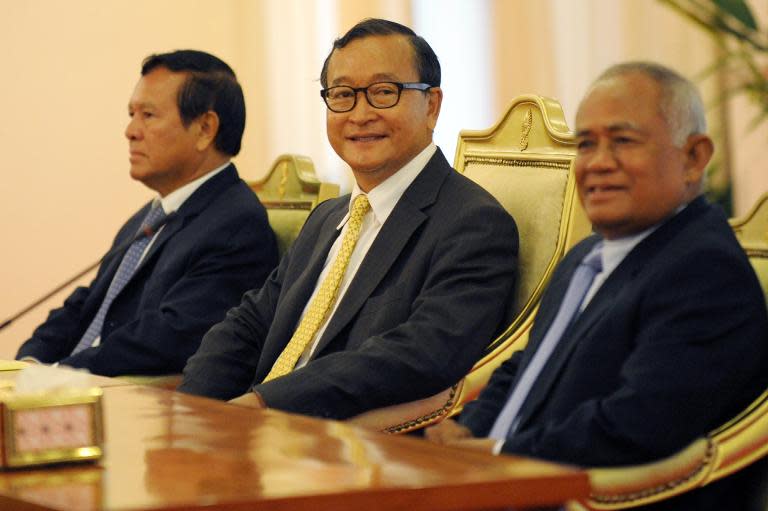Cambodia opposition ends year-long boycott of parliament
Cambodia's main opposition party struck a deal on Tuesday with strongman premier Hun Sen to end its year-long boycott of parliament triggered by a disputed election. The Cambodia National Rescue Party (CNRP) said it had agreed to break the deadlock and take up its seats in the National Assembly in return for a promise of electoral reforms. It had refused to join parliament since elections in July 2013, accusing Hun Sen's ruling Cambodian People's Party of stealing victory with widespread vote-rigging. "Today we have reached a common political resolution to end the political crisis," opposition leader Sam Rainsy told reporters after talks with Hun Sen. "We have no choice," he added. "The only appropriate way is to end the political crisis and the tense situation." Hun Sen, who has held power for nearly three decades, described the deal as a "success". Analysts say Rainsy's return to the negotiating table may have been spurred by last week's arrest of eight CNRP politicians for insurrection over a protest in the capital which saw clashes between demonstrators and security forces. The eight were released on bail shortly after the end of the talks Tuesday, according to a CNRP lawyer. Rights groups have denounced the charges against the politicians, who could face up to 30 years in prison if convicted. Under the agreement the parties will reform the National Election Committee -- a key demand by the opposition which accused the body of endorsing a vote riddled by fraud. The new committee will have nine members, four from each of the two main parties and another independent figure selected between them. A CPP official said that would pave the way for elections which will not take place before February 2018, despite an earlier call by the opposition for fresh polls to be held sooner. - 'Devil in the detail' - While the agreement offers a pathway through Cambodia's political impasse, some observers said it falls short of a cure-all. "I think the devil is in the detail," Ou Virak, of the Cambodian Centre for Human Rights, told AFP. "I think Hun Sen got what he wanted by getting the CNRP to end the deadlock and legitimise parliament and the government." "But the opposition will still have some cards to play. There is nothing to stop them from walking out of parliament... or going back to the streets." Opposition supporters have staged several major demonstrations against Hun Sen's government with Rainsy, a French-educated former banker, previously rejecting the poll result and vowing to fight for new polls. Hun Sen, 61, is also regularly criticised by campaigners for ignoring human rights and stamping out dissent. A crackdown on striking garment workers in January left four people dead. Official results of last year's poll gave the CPP 68 seats to 55 for the CNRP. The opposition garnered just 300,000 fewer votes than the ruling party. While it failed to unseat Hun Sen, the poll was the ruling party's worst election result since 1998. The CPP lost 22 seats in a sign of falling support for the strongman -- a former Khmer Rouge cadre who has vowed to remain in power until he is 74. But Tuesday's deal will see the CNRP lawmakers soon take their parliamentary oath, according to opposition spokesman Yim Sovann. It also will allow the CNRP to establish a television station and gives their lawmakers chairmanship of some parliamentary committees. Since his defection from the Khmer Rouge, Hun Sen has drawn popularity for overseeing Cambodia's transformation from a nation devastated by the regime's "Killing Fields" genocide era in the late 1970s to become one of Southeast Asia's more vibrant economies.




